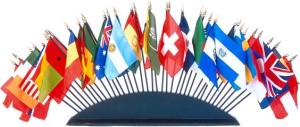 For many job applicants, a position with DFATD is a dream. Being stationed in prestigious cities such as London, Paris, Rome, Brussels, New York, and the Bahamas is what typically come to mind. Others dream about rubbing shoulders with powerful decision makers and attending several networking and cocktail events on a regular basis.
For many job applicants, a position with DFATD is a dream. Being stationed in prestigious cities such as London, Paris, Rome, Brussels, New York, and the Bahamas is what typically come to mind. Others dream about rubbing shoulders with powerful decision makers and attending several networking and cocktail events on a regular basis.
There are also financial incentives and “perks” to being abroad such as highly subsidized lodging, foreign service premium, hardship pay, and post differential bonus. Before factoring other advantageous that may apply (e.g., Private school education for children, and chauffeur amongst others) an employee can easily earn over $25 000 just by moving abroad. Also, the more years that one has spent abroad, the higher the Foreign Service Premium will be.
There are a selected few DFATD employees who enjoy the above (and even a smaller group early in their career); however, for many, life is not so simple. Several embassies are in international locations where consistent running and potable water, reliable electricity, safe and reliable food supplies, and overall security are serious concerns. Other embassies are located in areas where air and water pollution have been identified as extremely elevated by credible international organizations. While some of these problems can be temporarily managed, one eventually has to leave the complex and are exposed to these issues in their everyday lives on the streets, restaurants, offices, and supermarkets.
In addition to the above, is the impact that rotational assignments may have on families and relationships. Although many couples have successfully balanced their work and life commitments while perusing rotational assignments. Several have been unsuccessful. This is especially evident in children who many not adapt well to consistent relocation and the need to establish a new network of friends every few years.
However, once an individual is prepared to face both the elegant and “not so elegant” aspects of a rotational status. A position at DFATD can provide for a great career. There is a lot of support for individuals before going abroad (e.g., language training and briefing sessions) and while on assignment. One also has the ability to establish and maintain an international network of contacts which may prove useful on a professional and personal level in the future.
Insider’s Guide Commentary: I would definitely encourage a rotational career with DFATD as long as you are aware of the pros and cons of these positions and how they could affect your present and future relationships. I personally know various diplomats who have enjoyed great careers with DFATD while their children became well-rounded individuals who speak various languages with different extents of fluidity. These individuals were also capable of saving some funds while living abroad; albeit, some lived temporarily in undesirable locations to travel and explore nearby countries.
